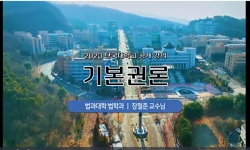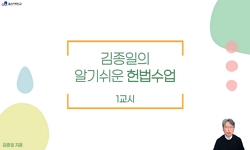본 연구는 2014년에 국회에서 활동한 헌법개정자문위원회가 제안한 헌법개정안의 내용을 검토한 것이다. 위 위원회는 그 구성에서부터 다양성을 갖추고 조문화작업도 수행하였다는 점 등에...
http://chineseinput.net/에서 pinyin(병음)방식으로 중국어를 변환할 수 있습니다.
변환된 중국어를 복사하여 사용하시면 됩니다.
- 中文 을 입력하시려면 zhongwen을 입력하시고 space를누르시면됩니다.
- 北京 을 입력하시려면 beijing을 입력하시고 space를 누르시면 됩니다.

2014년 국회 헌법개정자문위원회 개헌안에 대한 검토 = A Review of the Proposal of Constitutional Amendment Advisory Committee in the Korean National Assembly in 2014
한글로보기부가정보
국문 초록 (Abstract)
본 연구는 2014년에 국회에서 활동한 헌법개정자문위원회가 제안한 헌법개정안의 내용을 검토한 것이다. 위 위원회는 그 구성에서부터 다양성을 갖추고 조문화작업도 수행하였다는 점 등에서 기존의 헌법개정논의를 위한 위원회들과 차별화되어 있었고, 헌법개정논의에서 진전한 면을 보여주었다.
위원회는 기본권영역에서는 기본권확대를 위한 기본권규정들을 체계화하고 안전권, 정보기본권 등 헌법에 새로이 명시할 기본권들을 제시하고 있다.
반면에 이처럼 적지 않은 기본권규정들이 새로이 명시되도록 제안한 데 비추어 보면 인공지능(AI)으로 표상되는 이른바 제4차 혁명에 조응하는 기본권규정들이 좀 더 제안되었더라면 하는 아쉬움이 있다. 또한 사회적 양극화를 줄이는 국가에 대한 요구, 기본소득 등에 대한 국민적 욕구에 부응하는 생존권(사회권) 규정들도 앞으로 보다 더 적극적으로 담아 개정안이 보완되는 것이 필요하다고 생각된다. 앞으로의 개정논의과정에서 좀 더 추가되고 다듬어지길 기대해 본다.
국가권력규범 부분에 있어서는 권력의 분산을 가져오려는 방안으로 집행부 내에서도 대통령과 국무총리 간의 권한분담을 규정하고 있다. 국회도 양원제로 하여 상호견제하도록 하고 의원내각제적 요소의 도입으로 내각불신임제, 국회해산제 등을 규정하여 책임정치 구현을 위한 방안을 마련하자고 제안하고 있다.
문제는 우리에게 분권형이든 혼합형이든 그것을 실현하기 위한 기본 전제조건을 갖추어야 성공할 수 있을 것이다. 서로 경청하고 타협, 설득, 조정하고 협력하는 의회주의적 정신, 다원주의가 제대로 구현되어야 하는 것이다. 그리고 무엇보다도 혼합형을 채택하는 것이 당리, 정략에 악용되지 않아야 할 것은 물론이다. 그 점에서 이 제도의 특징이나 성공조건 등에 대해 국민들이 충분히 주지하는 것, 그것을 위해 학자들이 애쓰는 것이 필요하다. 사법권독립을 실질화하기 위한, 헌법적 위상을 가진 사법최고회의와 같은 법관ㆍ검사의 인사에 관한 권한을 가지는 헌법적 기구를 두는 것을 제안하지 않은 것은 매우 아쉽다.
2014년 국회 자문위의 개헌안은 이후 2017년 개헌논의에서 많은 참고가 되고 있다고 한다. 국회의 개헌특위 논의에서, 그리고 국가인권위원회가 기본권부분에 관한 개정안을 내면서 이를 참고하기도 하였다.
헌법의 내용이 방대한 영역에 걸쳐 관련되고 당장 헌법의 핵심인 기본권 영역 헌법규정만 하더라도 그러한데 그 외 국회, 대통령, 법원 등 국가권력 부분과 경제, 지방자치 부분 등도 있고 총강 부분도 있다. 이러한 넓은 영역을 모두 아우르면서 하나의 논문에 전부 그 분석을 할 수는 없다. 따라서 이번 논문에서는 일단 영역 전반에서 개정안의 중요 방향, 요소들을 짚어보는 것을 우선으로 하였다. 앞으로 시간을 좀더 두고 개별 영역별로 나누어(기본권, 국가권력규범 등으로) 분석, 정리, 검토를 하는 논문이 각론의 의미로서 연구되고 발표될 수 있을 것인데 본 연구가 장래의 그 연구들을 위한 가이드로서도 기여할 수 있을 것이라고 본다.
2014년 자문위 활동 출범 초에 통일시대의 헌법, 지방자치의 강화 등이 중요한 화두였는데 이 부분에 있어서는 충분한 결실을 이루지 못했다는 점이 매우 애석하다. 앞으로 집중되어야 할 개헌논의에서 중심적인 어젠다가 되어야 할 것이다.
다국어 초록 (Multilingual Abstract)
This study examines the contents of the constitutional amendment proposal prepared by the Constitutional Amendment Advisory Committee in the Korean National Assembly in 2014. That Committee was different from the prior committees studying the amendmen...
This study examines the contents of the constitutional amendment proposal prepared by the Constitutional Amendment Advisory Committee in the Korean National Assembly in 2014. That Committee was different from the prior committees studying the amendment of the Constitution in that it had diversity of composition and that it made the Constitutional amendment draft, and showed progress in discussing the amendment of the Constitution.
In area of basic rights, the committee systemizes basic rules for basic rights and proposes fundamental rights to be newly defined in the Constitution, such as the right to safety and the right to information.
On the other hand, it is regrettable if the basic rule regulations that correspond to the so - called Fourth Revolution represented by artificial intelligence (AI) have been suggested more. Also, I think that it is necessary for the amendment to be supplemented with more active provisions of the right to live (social rights) to meet the public desire for the nation to reduce social polarization and the introduction of basic income system, etc.
In separation of powers norms, the Committee proposes that powers be shared even within the executive branch, between the President and the Prime minister, as a way of bringing about the alleviation of power. The committee suggests that the National Assembly also consists of the Senate and the House of Representatives for checking each other and that parliamentary system (a vote of no confidence and parliamentary dissolution system) is added to strengthen political responsibility.
The amendment related to the mixed governmental system will be successful if we have the basic prerequisites to realize it. The parliamentarian spirit and pluralism that listen to each other, compromise, persuade, coordinate and cooperate must be properly implemented. And of course, it is a matter of course that the adoption of the mixed type should not be used badly for the interests of the ruling party or for the political arrangement. In this respect, it is necessary for scholars to work hard for the people to fully appreciate the characteristics of the system and the conditions of success.
This constitutional amendment proposal prepared by the Constitutional Amendment Advisory Committee in the National Assembly in 2014 is said to be a lot of reference in the discussion of the constitutional revision proposal in the National Assembly in 2017. The National Human Rights Commission also referred to this proposal in preparing his in fundamental rights of which protection is his inherent mission.
The contents of the Constitution are related to a vast scope. There are a lot of provisions, even limited to fundamental rights which is now the core of the Constitution. In addition to that, the Constitution includes the political powers such as the National Assembly, the President, and the courts, as well as the economy and local autonomy. It is impossible to analyze these large areas in this one article at the same time. Therefore, in this paper, first of all, it is important to examine the important directions and elements of this proposal 2014 throughout the areas. It will be possible to analyzes this proposal in more detail for part division (fundamental rights, political power norms, etc.) and publish in several papers in the future. In this respect, this study also can contribute as a guide to that future research.
At the beginning of the committee's activities in 2014, the revision of provisions about the reunification of Korea divides and the strengthening of local autonomy were important topics, and it is very pity that we did not have enough fruits in this part. It should be a central agenda in the further discussion of constitutional amendments to be concentrated.
참고문헌 (Reference)
1 국회 헌법개정 자문위원회, "활동결과보고서 Ⅲ" 2014
2 국회 헌법개정 자문위원회, "활동결과보고서 Ⅱ" 2014
3 국회 헌법개정 자문위원회, "활동결과보고서 Ⅰ" 2014
4 전광석, "헌법편제에 관한 연구" 한국헌법학회 12 (12): 9-40, 2006
5 헌법연구 자문위원회, "헌법연구 자문위원회 결과보고서" 2009
6 한국헌법학회, "헌법개정연구" 헌법개정연구위원회 2006
7 김종철, "헌법개정론의 원인진단과 개정방안의 실효성에 대한 소고-헌법연구자문위원회의 보고서를 중심으로-" 법과사회이론학회 (38) : 125-157, 2010
8 정재황, "헌법개정과 기본권" 한국법학원 134 (134): 150-199, 2013
9 조홍석, "한국헌법상 기본권 개정방향" 한국비교공법학회 7 (7): 107-126, 2006
10 김배원, "한국헌법사와 현행헌법 기본권장의 개정 방향" 한국비교공법학회 10 (10): 65-95, 2009
1 국회 헌법개정 자문위원회, "활동결과보고서 Ⅲ" 2014
2 국회 헌법개정 자문위원회, "활동결과보고서 Ⅱ" 2014
3 국회 헌법개정 자문위원회, "활동결과보고서 Ⅰ" 2014
4 전광석, "헌법편제에 관한 연구" 한국헌법학회 12 (12): 9-40, 2006
5 헌법연구 자문위원회, "헌법연구 자문위원회 결과보고서" 2009
6 한국헌법학회, "헌법개정연구" 헌법개정연구위원회 2006
7 김종철, "헌법개정론의 원인진단과 개정방안의 실효성에 대한 소고-헌법연구자문위원회의 보고서를 중심으로-" 법과사회이론학회 (38) : 125-157, 2010
8 정재황, "헌법개정과 기본권" 한국법학원 134 (134): 150-199, 2013
9 조홍석, "한국헌법상 기본권 개정방향" 한국비교공법학회 7 (7): 107-126, 2006
10 김배원, "한국헌법사와 현행헌법 기본권장의 개정 방향" 한국비교공법학회 10 (10): 65-95, 2009
11 허영, "한국헌법론" 박영사 2013
12 김철수, "학설판례 헌법학 (상)" 박영사 2009
13 정재황, "프랑스식 혼합정부제의 한국적 적실성" 법학연구원 29 (29): 301-353, 2017
14 정재황, "프랑스식 혼합정부제의 집행부 내 권한분담 - 대통령과 수상·내각 간의 권한분담을 중심으로 -" 한국헌법학회 23 (23): 333-387, 2017
15 정재황, "프랑스식 혼합정부제의 원리와 실제 및 한국에서의 적용가능성에 대한 검토" 카오스북 332-, 2017
16 "제348회 국회 (임시회) 헌법개정특별위원회회의록 제3호"
17 정재황, "신 헌법입문" 박영사 2017
18 정재황, "사회변화와 헌법변화 - 그 시론적 연구 -" 법학연구원 24 (24): 29-62, 2012
19 정재황, "사법 인사, 정치 아닌 헌법으로"
20 윤재만, "기본권보장제도 디자인으로서의 헌법개정" 한국헌법학회 16 (16): 229-264, 2010
21 김종세, "기본권 일반조항의 바람직한 헌법개정방향" 한국법학회 (34) : 19-40, 2009
22 김선택, "기본권 일반규정의 개정방안 연구" 12 (12): 2006
23 정태호, "권리장전의 개정방향" 한국공법학회 34 (34): 113-154, 2006
24 정재황, "국가인권위원회 기본권 개헌안"
25 "https://www.lawtimes.co.kr/Legal-Opinion/Legal-Opinion-View?serial=119888"
26 "http://www.n-opinion.kr/?pageid=4&page_id=88&mod=document&uid=38"
27 "http://www.assembly.go.kr/assm/notification/policyroom/policyroom03/assmCounsel/counselUserView.do?bbs_num=37634&no=5&search_key_n=&search_val_v=¤tPage=1"
28 "http://news.khan.co.kr/kh_news/khan_art_view.html?artid=201706202054035&code=990304#csidxc230a268c7da80fae2cbd1bfe731cb8"
29 Ph. Ardant, "Institutions politiques et Droit constitutionnel" L.G.D.J 2012
30 J. Giquel, "Droit constitutionnel et institutions politiques" L.G.D.J. 2016
31 P. Pactet, "Droit constitutionnel" Armand Colin 2015
32 F. Hamon, "Droit constitutionnel" L.G.D.J. 2014
33 L. Favoreu, "Droit constitutionnel" Dalloz 2016
동일학술지(권/호) 다른 논문
-
- 세계헌법학회한국학회
- 김성배
- 2017
- KCI등재
-
Right to education and rights of participants in education in Korean Constitution
- 세계헌법학회한국학회
- 변해철
- 2017
- KCI등재
-
- 세계헌법학회한국학회
- 문재완
- 2017
- KCI등재
-
- 세계헌법학회한국학회
- 정철
- 2017
- KCI등재
분석정보
인용정보 인용지수 설명보기
학술지 이력
| 연월일 | 이력구분 | 이력상세 | 등재구분 |
|---|---|---|---|
| 2027 | 평가예정 | 재인증평가 신청대상 (재인증) | |
| 2021-01-01 | 평가 | 등재학술지 유지 (재인증) |  |
| 2018-01-01 | 평가 | 등재학술지 유지 (등재유지) |  |
| 2015-01-01 | 평가 | 등재학술지 유지 (등재유지) |  |
| 2011-05-03 | 학회명변경 | 한글명 : 국제헌법학회한국학회 -> 세계헌법학회한국학회영문명 : Korean Branch Of International Association Of Constitutioanl Law -> Korean Association of International Association of Constitutional Law |  |
| 2011-01-01 | 평가 | 등재 1차 FAIL (등재유지) |  |
| 2009-01-01 | 평가 | 등재학술지 유지 (등재유지) |  |
| 2006-01-01 | 평가 | 등재학술지 선정 (등재후보2차) |  |
| 2005-05-25 | 학술지명변경 | 외국어명 : 미등록 -> World Constitutional Law Review |  |
| 2005-01-01 | 평가 | 등재후보 1차 PASS (등재후보1차) |  |
| 2003-07-01 | 평가 | 등재후보학술지 선정 (신규평가) |  |
학술지 인용정보
| 기준연도 | WOS-KCI 통합IF(2년) | KCIF(2년) | KCIF(3년) |
|---|---|---|---|
| 2016 | 1.6 | 1.6 | 1.2 |
| KCIF(4년) | KCIF(5년) | 중심성지수(3년) | 즉시성지수 |
| 1.15 | 1.11 | 1.468 | 0.24 |





 스콜라
스콜라







